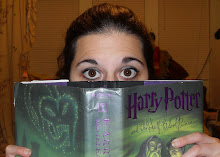It's summer! That means lots of reading, watching TV, and spending time at the community theatre in my case. As for this blog, it means catching up on all the old posts I didn't have the chance to write while I was at college. I'm going to try to post at least once a week and catch up. Expect quite a lot of Shakespeare and Dickens, as those were the two English classes I took last semester.
For the first post, Oliver Twist by Charles Dickens. This is the story of an orphan boy from his birth through his childhood and the many events during that time. While the plot was intriguing and suspenseful, I felt like the story focused more on everyone around Oliver rather than the title character himself. This is shown in the novel through the third-person point of view rather than first through Oliver's eyes. We rarely see inside Oliver's head. Therefore, Oliver seems more like a flat angelic archetype than a three-dimensional character. He is pure, even when everything around him is corrupted. This was my main complaint about the book. I had trouble connecting with a character that didn't seem human. In fact, the "bad" characters like Fagin, the Artful Dodger, Nancy the prostitute, and Bill Sikes were far more interesting and relatable.
This book was published in monthly installments from 1836-1837. The only novel proceeding it in Dickens's career was Pickwick Papers. At this time, Dickens was still trying to figure out what worked in his writing and publishing and what the readers desired. It is easy to see the progression of his writing and business skills when you read later works, like Great Expectations (post to come later). He relies more on characters than plot, usually, to develop his themes.
Oliver Twist is usually noted for its social themes. The novel shows the terrible conditions of the poor and orphans and demonstrates the skewed justice system in London. The settings in the novel are realistic because Dickens would walk those streets himself, searching for inspiration. But, many of the rich people that read his novels assumed that such places were fictional because they couldn't imagine that those poor conditions could be a reality to anyone. For example, Fagin and the rest of his group must steal to live, which Oliver finds abhorrent. Many of the rich upper class saw themselves in Oliver and his puritanical virtuous nature. This means that they would have also shared many of his views on the poor and the justice system in London.
Overall, Oliver Twist was a rather predictable novel. Dickens liked pleasing his audience and everything in the novel is wrapped up nicely with a neat bow. All the small details are interconnected in an unrealistic trait, but that's a typical Dickensian trait. If you're looking for a journey through Dickens or a plot-based read, I would recommend starting with Oliver Twist. But if you're looking for one novel to typify Dickens, it wouldn't be this one.
Happy reading and DFTBA!
Nadia
Saturday, May 19, 2012
Subscribe to:
Post Comments (Atom)

No comments:
Post a Comment